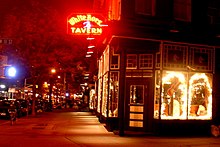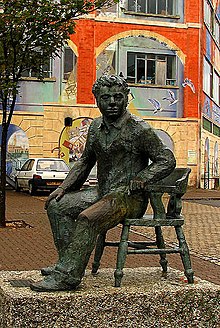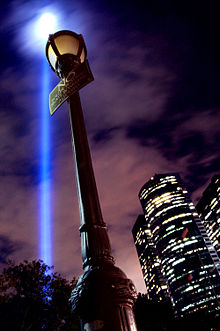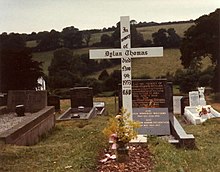Dylan Thomas
Appearance

And death shall have no dominion.
Dylan Marlais Thomas (27 October 1914 – 9 November 1953) was a Welsh poet and writer.
Quotes
[edit]

Push in their tides…

On tips of thought where thoughts smell in the rain…


- The force that through the green fuse drives the flower
Drives my green age; that blasts the roots of trees
Is my destroyer.
And I am dumb to tell the crooked rose
My youth is bent by the same wintry fever.- "The Force That Through the Green Fuse Drives the Flower" (1934), st. 1
- Light breaks where no sun shines;
Where no sea runs, the waters of the heart
Push in their tides;
And, broken ghosts with glow-worms in their heads,
The things of light
File through the flesh where no flesh decks the bones.- "Light Breaks Where No Sun Shines", st. 1 (1934), st. 1
- Dawn breaks behind the eyes;
From poles of skull and toe the windy blood
Slides like a sea;
Nor fenced, nor staked, the gushers of the sky
Spout to the rod
Divining in a smile the oil of tears.- Light Breaks Where No Sun Shines, st. 1 (1934), st. 3
- Light breaks on secret lots,
On tips of thought where thoughts smell in the rain;
When logics die,
The secret of the soil grows through the eye,
And blood jumps in the sun;
Above the waste allotments the dawn halts.- Light Breaks Where No Sun Shines, st. 1 (1934), st. 5
- The hand that signed the paper felled a city;
Five sovereign fingers taxed the breath,
Doubled the globe of dead and halved a country;
These five kings did a king to death.- "The Hand that Signed the Paper Felled a City", st. 1 (1936)
- When all my five and country senses see,
The fingers will forget green thumbs and mark
How, through the halfmoon's vegetable eye,
Husk of young stars and handfull zodiac,
Love in the frost is pared and wintered by.
- They shall have stars at elbow and foot;
Though they go mad they shall be sane,
Though they sink through the sea they shall rise again;
Though lovers be lost love shall not;
And death shall have no dominion.- "And Death Shall Have No Dominion", st. 1 (1943)
- After the first death, there is no other.
- "A Refusal To Mourn The Death, By Fire, Of A Child In London", st. 4 (1946)
- And I saw in the turning so clearly a child's
Forgotten mornings when he walked with his mother
Through the parables
Of sunlight
And the legends of the green chapels.- "Poem in October", st. 5 (1946)
- Do not go gentle into that good night,
Old age should burn and rave at close of day;
Rage, rage against the dying of the light.
- One Christmas was so much like another, in those years around the sea-town corner now, out of all sound except the distant speaking of the voices I sometimes hear a moment before sleep, that I can never remember whether it snowed for six days and six nights when I was twelve or whether it snowed for twelve days and twelve nights when I was six.
- "A Child's Christmas in Wales", from Quite Early One Morning (1954)
- It is spring, moonless night in the small town, starless and bible-black, the cobblestreets silent and the hunched, courters'-and-rabbits' wood limping invisible down to the sloeblack, slow, black, crowblack, fishingboat-bobbing sea. The houses are blind as moles (though moles see fine tonight in the snouting, velvet dingles) or blind as Captain Cat there in the muffled middle by the pump and the town clock, the shops in mourning, the Welfare Hall in widows' weeds. And all the people of the lulled and dumbfound town are sleeping now.
- "Under Milk Wood" (1954)
- I fell in love — that is the only expression I can think of — at once, and am still at the mercy of words, though sometimes now, knowing a little of their behavior very well, I think I can influence them slightly and have even learned to beat them now and then, which they appear to enjoy.
- Poetic Manifesto, published in the Texas Quarterly (Winter 1961)
- You can tear a poem apart to see what makes it technically tick... You're back with the mystery of having been moved by words. The best craftsmanship always leaves holes and gaps in the works of the poem so that something that is not in the poem can creep, crawl, flash, or thunder in. The joy and function of poetry is, and was, the celebration of man, which is also the celebration of God.
- Poetic Manifesto

In the sun born over and over,
I ran my heedless ways.
Fern Hill (1946)
[edit]
Though I sang in my chains like the sea.
- Now as I was young and easy under the apple boughs
About the lilting house and happy as the grass was green,
The night above the dingle starry,
Time let me hail and climb
Golden in the heydays of his eyes.
And honoured among wagons I was prince of the apple towns.- St. 1
- In the sun that is young once only,
Time let me play and be
Golden in the mercy of his means.- St. 2
- And the sabbath rang slowly
In the pebbles of the holy streams.- St. 2
- And honoured among foxes and pheasants by the gay house
Under the new made clouds and happy as the heart was long,
In the sun born over and over,
I ran my heedless ways.- St. 5
- Time held me green and dying
Though I sang in my chains like the sea.- St. 6
Misattributed
[edit]- Swansea is the graveyard of ambition
- Commonly attributed to Thomas, but scholars at Swansea University claim there is "no evidence that he ever wrote or spoke those words"[1]
- Ambition is critical
- Written by David Hughes in 1992 and inscribed on Swansea railway station, commissioned by Swansea council. Misattributed to Thomas in a Plaid Cymru manifesto[1]
Quotes about Thomas
[edit]
- Here in Israel, of course, every generation backs away from its parents. Rebels against the old. That has always been the case, and not here alone. Take, for example, Dylan Thomas, now largely ignored. You may be sure that in a few years some Yale professor will rediscover his genius.
- Yehuda Amichai 1984 interview in We Are All Close: Conversations with Israeli Writers by Haim Chertok (1989)
- in that way, I disagree with Dylan Thomas and what he said in his poem, "Do not go gentle into that good night..." When life is through with me, I want to say to it as you would say to a lover, or a friend, or a child: 'Goodbye! It's been a ball...truly. And thank you.'
- 1974 interview in Conversations with Maya Angelou (1989)
- It’s the place where poetry comes to die … That’s me.
- Annie Clark, joking about her stage name "St. Vincent", being one she chose from the name of the hospital where Thomas spent his last hours of life, as quoted in "Friendly, and Just a Bit Creepy: St. Vincent Defies Categories" in The New York Times (7 May 2005)
- Not only is pot way cooler than alcohol, it’s also non-toxic. Dylan Thomas could not have smoked himself to death.
- Greta Gaines, in rhetoric for an end to Marijuana prohibition laws, in "Why Are No Women Celebrity Stoners Willing to Come Out of the Greenhouse?" (16 August 2012)
- I think that poetry, in general, after a certain point in a poet's life, has to do with the acknowledgment of mortality. And even the most joyful poems have to do with, "Yes, let's not forget that life is brief." Once I started dealing with grief in poetry, I discovered that I had found my way to poetry. I think that so many young poets are only writing about the joy of love and that sort of thing and don't understand that the great poetry, like Dylan Thomas's "Do Not Go Gentle" and like Wordsworth's "Intimations" and "Tintern Abby," has all been a moment when the poet realizes that "this is my time to express what I have gathered in this brief life."
- Judith Ortiz Cofer, interview (2000) in A Poet's Truth: Conversations with Latino/Latina Poets
References
[edit]- ↑ a b "Plaid Cymru wrongly attributes Dylan Thomas quote". BBC News. 2011-04-12. Retrieved on 2022-11-21.
External links
[edit]- Profile at the Poetry Foundation
- Profile with poems - written and audio, at the Poetry Archive
- Dylan Thomas Official Family Web Site, Swansea
- BBC Wales' Dylan Thomas site
- "Poem in October" recited by Dylan Thomas, BBC Radio (September 1945)
- Dylan Thomas on IMDb
- Works by Dylan Thomas (public domain in Canada)
- The Dylan Thomas Collection at the Harry Ransom Center University of Texas at Austin
- Audio files: Anthology Film Archives - including Dylan Thomas (drunk), Symposium at Cinema 16 (28 October 1953)


